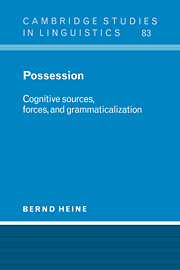5 - Evaluation
Published online by Cambridge University Press: 27 October 2009
Summary
The main claim made in this work is that possession, as it is manifested in language structure, can be traced back to other domains of human experience. This observation is not new, as we will see in the first section of this chapter, where a number of alternative approaches are briefly discussed. Some implications of the approaches used and the findings arrived at in previous chapters are reviewed and summarized in the remainder of this chapter.
Alternative approaches
The study of possession has been approached from a number of different perspectives. In the present section, the framework used in the preceding chapters is related to alternative views on the relevant subject-matter. To this end, a few salient studies that have contributed to the analysis of predicative possession in some way are briefly looked at. Selection is highly restricted; possession has been a popular topic in linguistics, and to do justice to all the studies that have been devoted to this topic in the course of this century would require a separate, book-length treatment. Priority is given to works that in some way or other contribute to solving the problems discussed in the introductory chapter (section 1.4).
That there are systematic correlations in case marking between possessive constructions, on the one hand, and the morphosyntax of transitivity, perfect or perfective forms on the other, has been demonstrated first by Allen (1964). Allen does not attempt to account for these correlations; accordingly, it remains unclear, for example, whether they are synchronic or diachronic in nature, or what they mean with reference to linguistic categorization. Ten years earlier, pioneering work on possession was published by Locker (1954).
Information
- Type
- Chapter
- Information
- PossessionCognitive Sources, Forces, and Grammaticalization, pp. 209 - 239Publisher: Cambridge University PressPrint publication year: 1997
